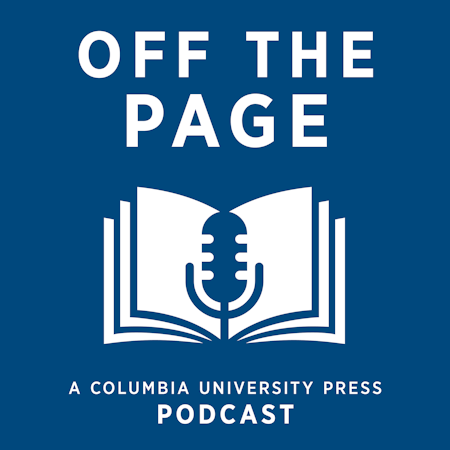
Off the Page: A Columbia University P...
Interviews with Columbia University Press authors.
301
Geoffrey C. Goble, "Chinese Esoteric Buddhism: ...
Goble examines the emergence and early history of esoteric Buddhism in China.,,
68 min
302
Nicole CuUnjieng Aboitiz, "Asian Place, Filipin...
Aboitiz reconnects the Philippine Revolution to the histories of Southeast and East Asia through an innovative consideration of its transnational political setting and regional intellectual foundations....
57 min
303
Michael C. Davis, "Making Hong Kong China: The ...
It is difficult to understand the pace or extent of the changes in Hong Kong since the protests began in June 2019...
81 min
304
Eithne Quinn, "A Piece of the Action: Race and ...
Quinn explores the transitional years following the civil rights movement of the 1960s, in order to chart the struggle by Black film makers for rights, recognition and representation....
45 min
305
Matthew Hart, "Extraterritorial: A Political Ge...
Hart explores how texts—literary and visual—help us engage with the space that goes beyond the limits of visible geographical borders and legal regulations...
50 min
306
Joan Scott, "On the Judgment of History" (Colum...
Scott challenges us to question the persistence of structures of power and the very idea of the nation-state, while encouraging us to rethink whether there truly is such a thing as the judgment of history...
60 min
307
John Whysner, "The Alchemy of Disease" (Columbi...
Whysner offers an accessible and compelling history of toxicology and its key findings....
47 min
308
Jill Richards, "The Fury Archives: Female Citiz...
Richards radically rewrites our understanding of first-wave feminism by demonstrating its proximity to international avant-garde movements including surrealism,..
49 min
309
Thom van Dooren, "The Wake of Crows: Living and...
Crows can be found almost everywhere that people are,..
66 min
310
Brian R. Dott, "The Chile Pepper in China: A Cu...
Chinese culture and the chile pepper have been intertwined for centuries. Yet, this was not always the case...
78 min
311
Victor McFarland, "Oil Powers: A History of the...
The relationship between the United States and Saudi Arabia is a critical feature of the modern international system...
61 min
312
Victor McFarland, "Oil Powers: A History of the...
The relationship between the United States and Saudi Arabia is a critical feature of the modern international system...
61 min
313
Albena Azmanova, "Capitalism on Edge: How Fight...
Capitalism seems to many to be in a sort of constant crisis, leaving many struggling to make ends meet...
66 min
314
Steven Heine, "Readings of Dōgen's 'Treasury of...
Heine gives us a comprehensive introduction to this essential Zen text, offering a textual, historical, literary, and philosophical examination of Dōgen’s treatise...
53 min
315
Philip Thai, "China's War on Smuggling: Law, Il...
Thai chronicles the vicissitudes of smuggling in modern China—its practice, suppression, and significance—to demonstrate the intimate link between illicit coastal trade and the amplification of state power...
16 min
316
Thomas Borstelmann, "Just Like Us: The American...
The American attitude towards outsiders has always been ambivalent....
62 min
317
Alex Sayf Cummings, "Brain Magnet: Research Tri...
Beginning in the 1950s, a group of academics, businesspeople, and politicians set out on an ambitious project to remake North Carolina’s low-wage economy...
35 min
318
Gaurav Desai, "Commerce with the Universe: Afri...
Desai offers an alternative history of East Africa in the Indian Ocean world...
76 min
319
Johannes Bronkhorst, "A Śabda Reader: Language ...
Bronkhorst makes the case through an extensive introduction and select translations of important Indian texts that language has a crucial role in Indian thought...
62 min
320
Eugenia Lean, "Vernacular Industrialism in Chin...
Lean offers a new understanding of industrialization, going beyond material factors to show the central role of culture and knowledge production in technological and industrial change....
52 min
321
Yuhang Li, "Becoming Guanyin: Artistic Devotion...
How did Buddhist women access religious experience and transcendence in a Confucian patriarchal system in imperial China?
56 min
322
Jamieson Webster, "Conversion Disorder: Listeni...
What do psychoanalysts do with bodies, and what do they do with them now?
55 min
323
Minou Arjomand, "Staged: Show Trials, Political...
Arjomand provides a startling account of the many intersections between theatre and trials in Germany and the United States from the 1930s to the 1960s...
73 min
324
E. Lonergan and M. Blyth, "Angrynomics" (Agenda...
How are we going to address inequality and put the economy on a sounder footing?
44 min
325
Mona L. Siegel, "Peace on Our Terms: The Global...
Siegel explores the previously neglected history of a diverse group of women from around the world who fought for women’s rights as male politicians forged a new world order...
59 min